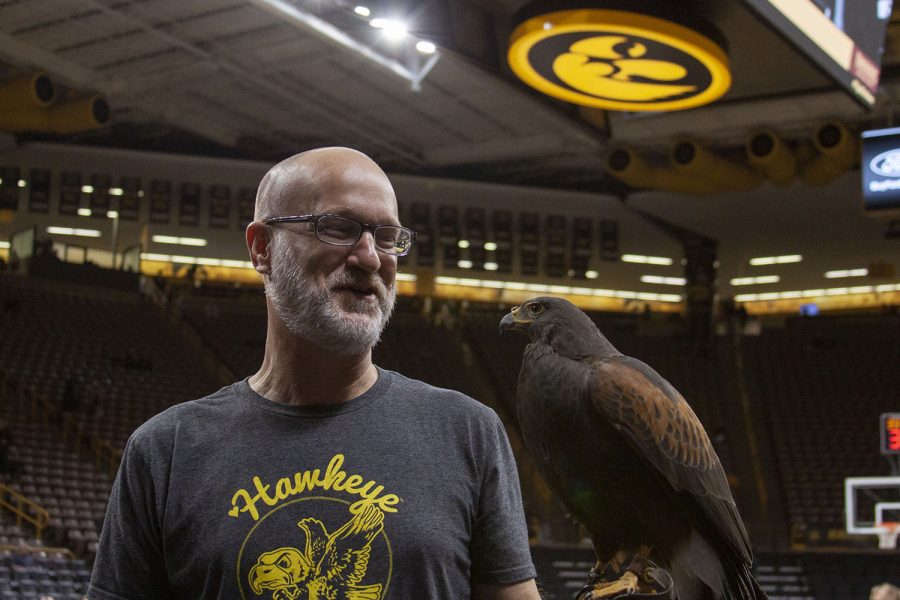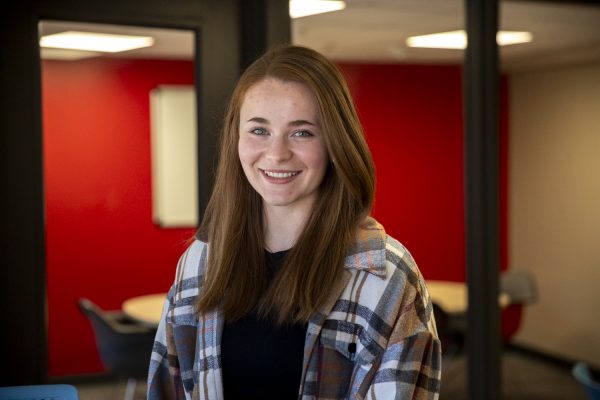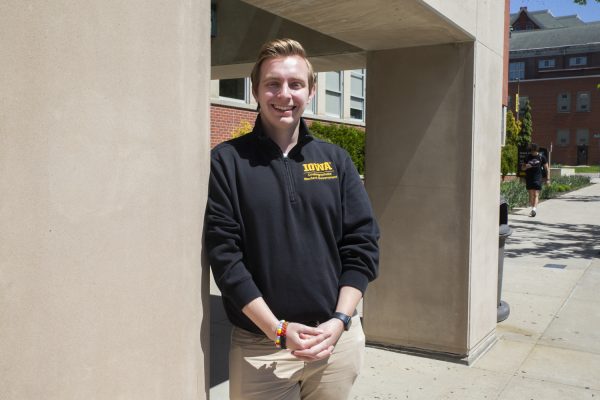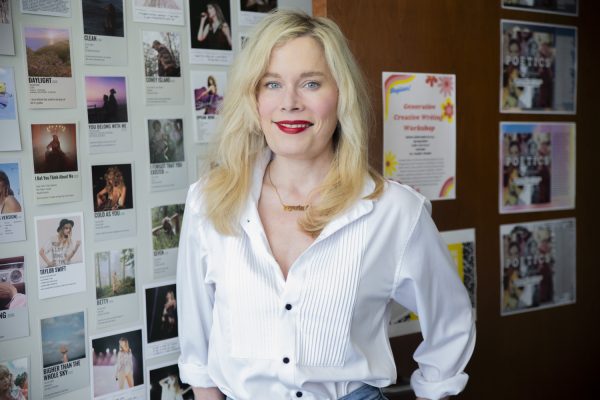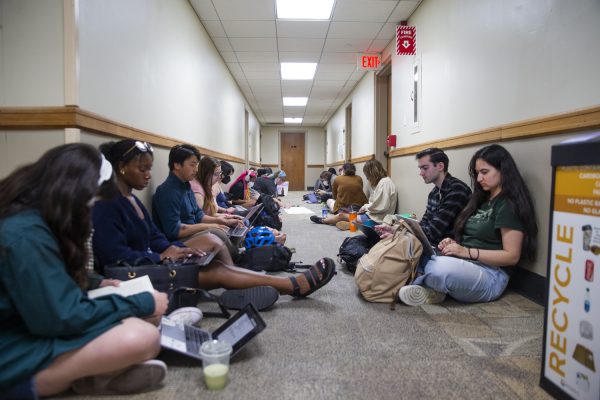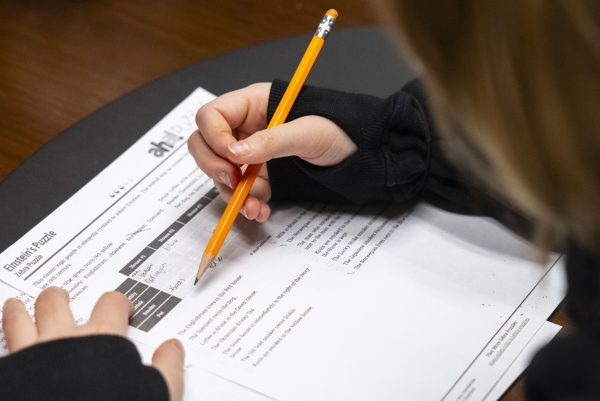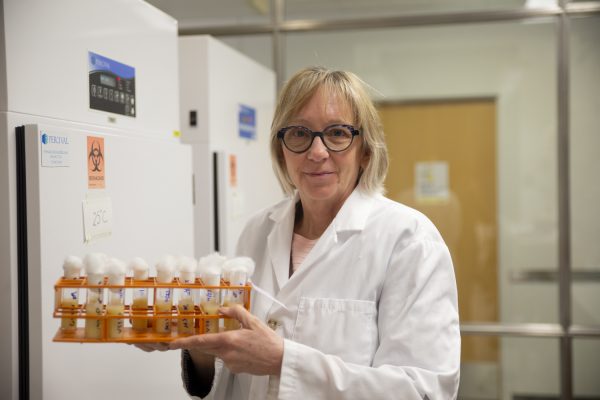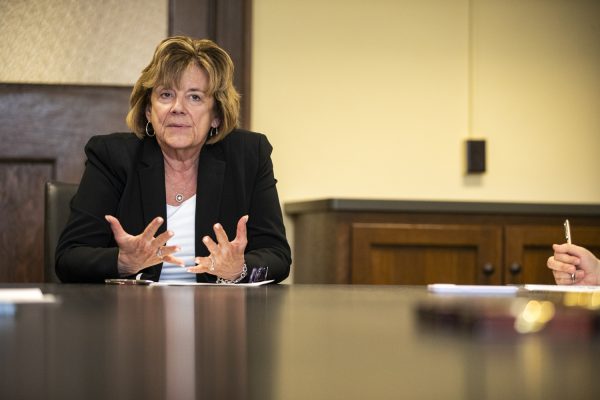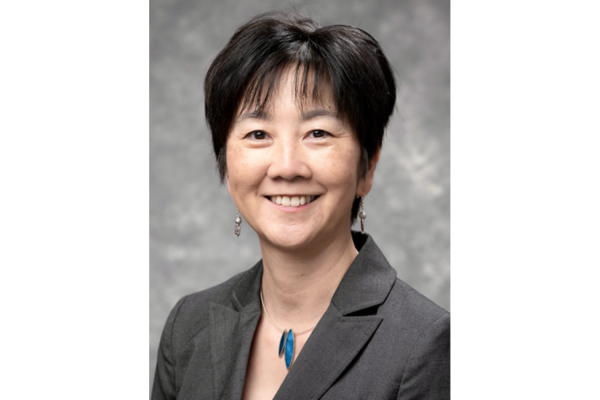UI School of the Wild looks to expand statewide
The University of Iowa program started to expand statewide two years ago to promote education and experiential learning for sixth-graders in the Iowa City area.
UI Wild director David Conrads poses with a hawk at Carver-Hawkeye Arena in Iowa City on Feb. 9, 2022.
February 9, 2022
The School of the Wild, a program through the University of Iowa College of Education, is looking to expand across the state of Iowa, providing students with outdoor learning opportunities.
For more than 20 years, the School of the Wild has developed a partnership with the Iowa City Community School District in the fall and spring. All sixth-grade students in the district attend the week-long course to experience and learn about Iowa’s wildlife.
The school also collaborates with teachers in the district and College of Education students, as it provides one of the state-required student teaching experiences.
Jay Gorsh, School of the Wild director, said the program has stretched across 24 counties in just the last two years and focuses on five themes across the week-long camp. Three of the five themes focus on Iowa’s habitats, which are the wetlands, woodlands, and prairies.
Gorsh said in Iowa City, K-12 students focus on archaeology and ornithology, the study of birds. He said themes depend on the state of the environment and its habitats.
“The big thing for us is trying to make sure we can get as many kids this opportunity as we can,” Gorsh said. “Now that we’re in the College of Education, we’re working even more towards [finding] what support we can provide for teachers.”
The School of the Wild is one part of the Wildlife Instruction and Leadership Development program, which also includes the Iowa Raptor Project and the Iowa Wildlife Camps.
All three were previously managed by the University of Iowa’s Recreational Services and moved to the College of Education last August.
Dan Clay, UI College of Education dean, said the educational experiences provided by the School of the Wild are invaluable for students and future teachers.
“We’re better preparing our future teachers how to use the outdoor environment to engage students and help them improve their learning outcomes through engaging in the outdoors,” Clay said.
The School of the Wild separates itself from other conservation education programs in its collaboration with teachers and mix of formal and informal educators, Gorsh said.
“We train the teachers to be able to provide instruction,” Gorsh said. “Teachers are busy teaching their theme, while our informal educators are teaching others. It’s different than a traditional field trip model.”
Clay said the more exposure and engagement young students can get with the wild, the more environmentally conscious they will be in the future. Research and literature, Clay said, show that outdoor education can also aid in teaching a wide range of students in a variety of ways.
“It’s another effective way to engage students with special needs or disabilities,” Clay said. “And active learning in the outdoors can help with the mental health of students, so there are a lot of good reasons how students benefit from being outdoors.”
Gorsh said the program has broad goals, both local and statewide, in the near future.
“I think for our Iowa City schools, it’s a matter of continuing to be creative in how we can work with our teachers so they can get even more out of their School of the Wild [experience],” Gorsh said. “But really, the big thing is expanding the outreach effort across the state. Of course, our Iowa City teachers and schools play an important role in that because it’s where we’ve learned.”
David Conrads, the WILD program director, said the program’s move to the College of Education was logical because of the highly educational nature of the school.
“All of our programming is very educationally focused and also reaches into the school system and the school year,” Conrads said. “It really fit well with the educational mission of the college. It really gets us up close with students to be able to engage with them and give them opportunities to teach and work in our programs.”
For K-12 students, the experience is interdisciplinary, he said. Students face language arts, math, and other topics throughout their wildlife experiences.
Conrads said the growth of the School of the Wild program, in Iowa City and throughout the state, also strongly motivated the move.
“In ecological terms, we were reaching our carrying capacity,” Conrads said. “If you have too many people, it’s not feeling too wild anymore.”
The School of the Wild has been partnered with elementary schools in the area for over 20 years, Conrads said, and every sixth-grade student in the Iowa City Community School District spends one week learning in the MacBride Nature Recreation Area.
“A lot of students that come to us have very little exposure to the wild,” Conrads said. “What we see in these extended experiences is a comfort level that kind of takes over. Nature speaks, and it’s pretty cool to see the lightbulbs go off.”



